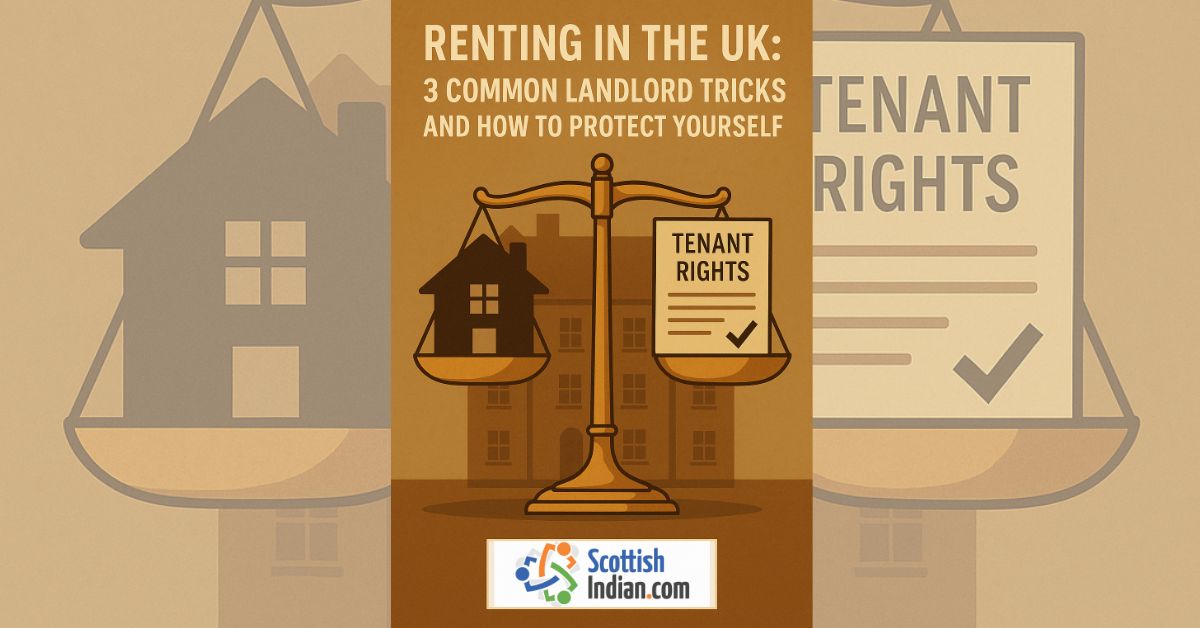Renting in the UK can be a maze of contracts, deposits, and fine print, especially if you’re new to the system. Many NRIs and international tenants find themselves caught off guard by unfair landlords who exploit gaps in understanding of UK landlord tenant laws. From withheld deposits to surprise visits, it’s easy to feel powerless. But once you know your rights, you can turn the tables and protect yourself against the most common landlord tricks.
Whether you’re an NRI moving to the UK, an international student settling into your first flat, or a professional renting short-term, understanding UK landlord-tenant laws is your best protection.
Here’s a look at the three most common tricks landlords use and how you can fight back legally and confidently.
1. The Deposit Dilemma: Keeping Your Money “for Cleaning”
The Trick:
Your landlord claims your deposit is being kept for minor wear and tear like a smudge on the wall, a scuff on the carpet, or “blue-tack marks.”
Your Right:
Under UK law, your landlord must protect your deposit in a government-approved Tenancy Deposit Scheme (TDP) within 30 days of receiving it. These include:
If your landlord fails to protect your deposit, you can take them to court and they could be ordered to pay you 1–3 times the deposit amount.
What You Can Do:
- Always ask for written confirmation of deposit protection.
- When you move out, take timestamped photos of every room.
- If there’s a dispute, the TDP acts as a free, independent referee.
Learn more: Check your deposit status on the UK Government’s tenancy deposit protection page.
2. The Surprise Visit: Entering Without Notice
The Trick:
Your landlord “drops by” to check something or sends a repair person without informing you first.
Your Right:
You are legally entitled to “quiet enjoyment” of your rented home.
That means your landlord cannot enter the property without giving you at least 24 hours’ written notice (by email, text, or letter). The visit must also happen at a reasonable time.
Exceptions:
- Real emergencies like fire, flooding, or gas leaks.
What You Can Do:
- Politely remind them of your right to quiet enjoyment.
- If they keep turning up unannounced, put it in writing and document every incident.
- You can contact Citizens Advice or Shelter UK for free legal support.
Landlords who ignore this rule could be in breach of their tenancy obligations which is something courts take seriously.
3. The Maintenance Excuse: Ignoring Major Repairs
The Trick:
Your heating stops working in winter, the ceiling leaks, or mould spreads and your landlord insists you caused it or says, “I’ll fix it next month.”
Your Right:
The landlord is legally responsible for ensuring the property is safe, habitable, and in good repair.
This includes:
- Structural integrity (roof, walls, windows, doors)
- Boilers, plumbing, and heating systems
- Damp and mould problems
If your landlord delays repairs, you can contact your local council’s environmental health department. They can inspect the property and, if needed, issue a legal enforcement notice to make the landlord act.
What You Can Do:
- Always report repair issues in writing (email or text).
- Keep copies of all messages and photos of the damage.
- If ignored, seek advice from Shelter UK’s repair rights guide.
Ignoring essential repairs can be classed as “housing disrepair”, and tenants may be eligible for rent reductions or compensation in severe cases.
Your Quick Legal Checklist
Before signing a tenancy or renewing your contract:
✅ Confirm your deposit is protected in a government scheme.
✅ Ask for your landlord’s contact details and emergency process.
✅ Read your tenancy agreement carefully, even the small print.
✅ Report repairs early and document everything in writing.
✅ Keep your own copies of rent receipts or bank transfers.
Useful Resources for Tenants
- Citizens Advice — Free, confidential legal guidance for renters.
- Shelter UK — Expert advice on housing rights, evictions, and repairs.
- Gov.uk Housing and Local Services — Official information on renting, deposits, and tenancy law.
- The Property Ombudsman — Dispute resolution service for estate and letting agents.
For those new to Britain, visit Moving & Settling in the UK on ScottishIndian.com for more practical insights on housing, culture, and everyday living as an international resident
Some landlords count on tenants not knowing the law but once you do, you have the power to push back.
UK housing rules are clear, and your rights don’t disappear just because you’re a student or foreign tenant.
Protect yourself. Ask questions. Put everything in writing. And remember ‘you’re not alone’. Organisations like Shelter and Citizens Advice exist to make sure every renter gets a fair deal.






